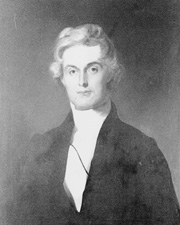William Harper (South Carolina politician) facts for kids
Quick facts for kids
William Harper
|
|
|---|---|
 |
|
| United States Senator from South Carolina |
|
| In office March 8, 1826 – November 29, 1826 |
|
| Appointed by | Richard Irvine Manning I |
| Preceded by | John Gaillard |
| Succeeded by | William Smith |
| Speaker of the South Carolina House of Representatives | |
| In office November 24, 1828 – December 20, 1828 |
|
| Governor | John Taylor Stephen Decatur Miller |
| Preceded by | John Belton O'Neal |
| Succeeded by | Benjamin Faneuil Dunkin |
| Member of the South Carolina House of Representatives from St. Philip's and St. Michael's Parish | |
| In office November 24, 1828 – December 20, 1828 |
|
| Personal details | |
| Born | January 17, 1790 Antigua |
| Died | October 10, 1847 (aged 57) South Carolina |
| Political party | Jacksonian |
William Joseph Harper (born January 17, 1790 – died October 10, 1847) was an important judge, politician, and thinker from South Carolina. He played a big role in the state's history during the early 1800s.
Political Career of William Harper
William Harper was born in Antigua and studied in Baltimore. He became a very well-known lawyer in Columbia in the 1810s.
In 1826, the Governor of South Carolina, Richard Manning, chose Harper to be a U.S. Senator. This happened after the previous senator, John Gaillard, passed away. Harper served as a senator for a short time, from March to December 1826. After that, the South Carolina legislature elected William Smith to the position.
After his time in the U.S. Senate, Harper moved to Charleston. He became very active in South Carolina state politics. He served in the state's House of Representatives and as a judge on the South Carolina Court of Appeals. He was also a state chancellor, which is a type of judge, from 1835 until he died.
During the 1820s and 1830s, Harper strongly supported South Carolina's rights. He believed in free trade and that states should have more power. He was a big supporter of the nullification movement. This movement argued that states had the right to reject federal laws they thought were against the U.S. Constitution.
William Harper's Views on Slavery
William Harper is often remembered for his strong support of slavery. He believed that slavery was not just something that had to exist, but that it was actually good for society.
In 1838, he gave a lecture called Memoir on Slavery. In this lecture, he said that slavery helped society progress while avoiding problems seen in other places. He thought that the Southern states, which had slavery, had a good balance. He believed this balance allowed for economic and technological growth without the chaos of big cities or industrial areas.
Harper looked at other countries to support his ideas. He thought that countries without slavery, especially in northern climates like Great Britain, had many problems like inequality. He also believed that non-slaveholding countries in warmer areas, such as Spain and Mexico, were falling behind. He felt that only slaveholding places like the Southern U.S., Brazil, and Cuba were making good progress.
While he might have said that slavery was a "necessary evil" in some ways, Harper mostly focused on what he saw as its positive effects. His ideas that slavery was a social good made him a leading figure in the movement that defended slavery. Other important people who shared similar views included Thomas Roderick Dew and James Henry Hammond.
See also
- List of United States senators born outside the United States

